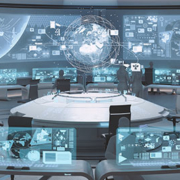What to Look for in a Work Computer
Short answer: the features that you need in a computer largely depend on the type of work that you do.
An architect who wants to generate 3D renderings of buildings, for instance, will need more processing power than a writer who simply wants to browse the internet and store Word files.
Although different professionals need unique features from their computers, there are some key items that you can look for when choosing a work computer.
The following guide will help you decide which features you need for your profession.
Central Processing Unit (CPU)
A computer’s central processing unit (CPU) is one of its most essential parts. The CPU handles all of the instructions that software gives the computer. Without a good CPU, you’ll find that your work computer operates at a frustratingly slow pace.
At minimum, you want to find a computer with a dual-core CPU with a 2.5GHz speed. A dual-core CPU lets your computer focus on two operations simultaneously, so it comes in handy even if you just want to perform research online while taking notes on word processing software.
Related: Title Fight: Break/Fix vs. Managed IT Services
Today, many CPUs have four or eight cores, which makes them useful for analyzing large amounts of data and running multiple applications at the same time. AMD even makes a 16-core processor with an incredible speed of 4.0GHz.
Very few people need that much power, though.
You should only consider it if you make video games, edit HD video or perform other intensive tasks. The 16-core processor’s $950 price tag will keep most people away from this option.
Random Access Memory (RAM)
A computer’s random access memory (RAM) is nearly as important as its CPU. When your computer has an application or file open, it relies on RAM to store information. For instance, when you make changes to a Word document and save the file, the request happens with RAM before it gets sent to the computer’s hard drive.
Most people need 8GB of RAM for their work computers. If you need exceptional processing speed for video production, editing music or rendering graphics, then you should look for a computer with 16GB of RAM.
Hard Drive Storage Space
Computers store all of their long-term information in their hard drives. The amount of hard drive storage space that you have will define how many applications and files you can keep on your computer.
Related: 3 Types of Clouds: Which is Right for You?
The most important aspect of choosing a hard drive is knowing how much space you need for your operating system (OS) and software. If you primarily rely on cloud applications, then you may not need more than 16GB of storage. If you plan to use software stored on your computer, though, then you should look for a hard drive with at least 232GB of storage space.
Most people don’t need to worry too much about storing files on their work computers. If you ever run out of room on your computer, you can always use an external hard drive. You can buy an external hard drive with 4TB of space for about $200. Remember, though, that you still need enough room on your computer’s hard drive for your OS and software. You can run software from an external hard drive, but doing so often leads to poor performance that will make you inefficient.
Graphics Cards
If you work on video production, image rendering and other highly visual projects, then you should get a computer with a dedicated graphics card. The graphics card will handle much of the processing power needed to create and display your images.
Very few people, however, need additional graphics adapters. Most of today’s computers come with integrated graphics adapters that exceed work needs.
Trouble Choosing Workstations for Business?
Choosing a new work computer can feel like a challenging task. Once you know how you plan to use your computer, though, it becomes much easier to decide what features to look for while you browse your options.
It’s even more difficult when you consider that you’ll have to choose a machine that works for your entire office. Or, having to mix-and-match ones that work for people with different skillsets.
We’re here to help you keep your business running with the right technology. For any questions on the right computers, reach out to us. We’re happy to help.























